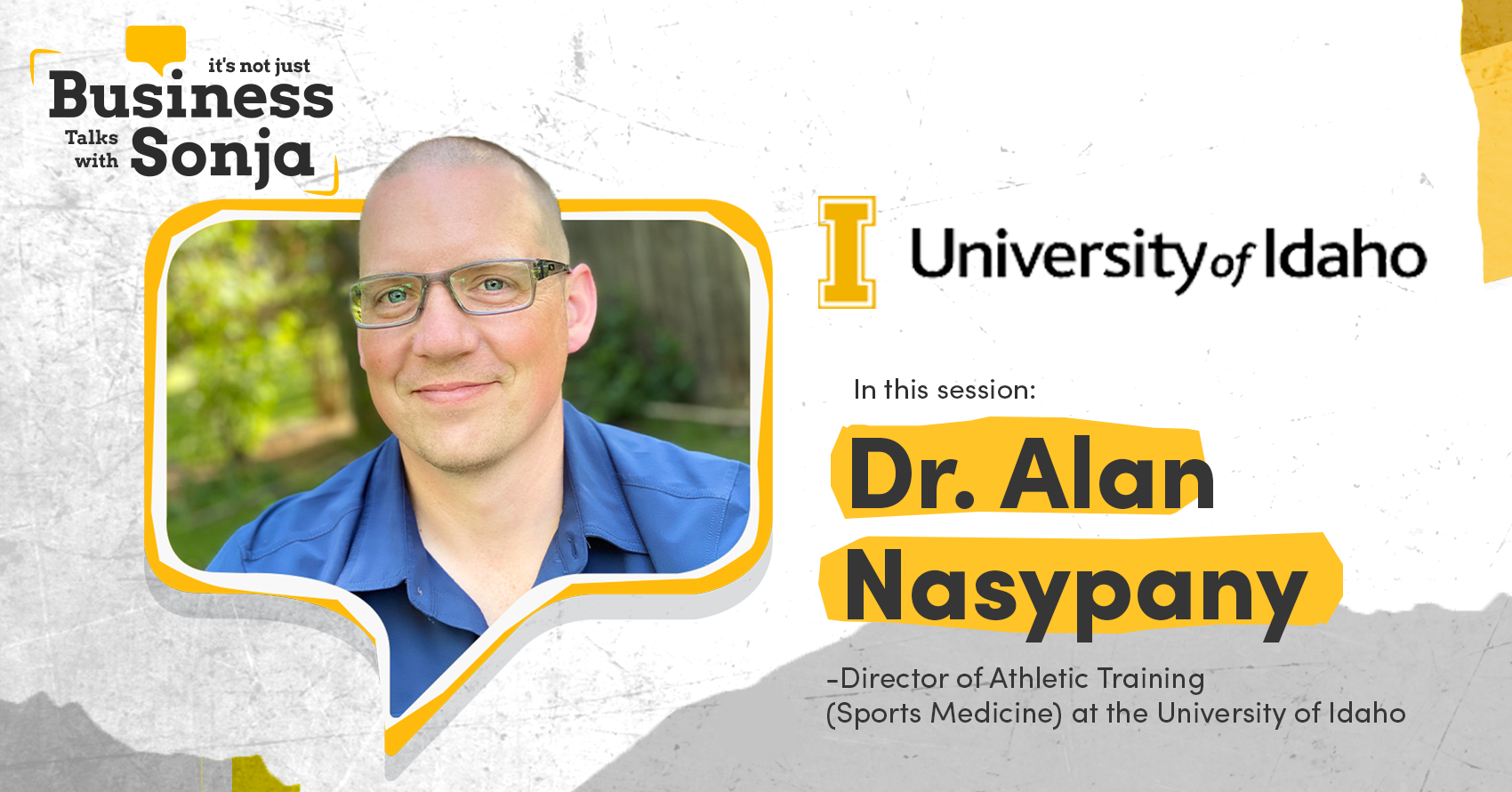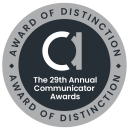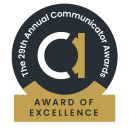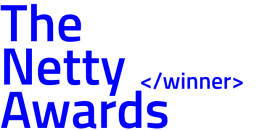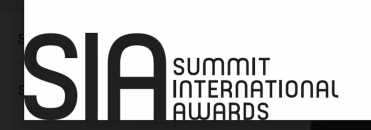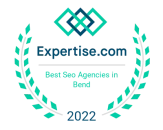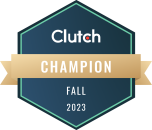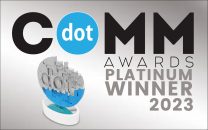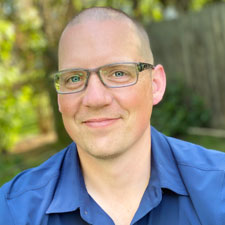
Dr. Alan Nasypany has completed dozens of cutting-edge treatment intervention trainings and is a Master Instructor for Primal Reflex Release Technique. He was the first in the nation to develop a doctorate program in Athletic Training (Sports Medicine) at the University of Idaho, where he is the Director of two graduate programs. Dr. Nasypany has over 20 years of experience as a healthcare professional specializing in sports medicine, chronic pain, and unresponsive health conditions.
Additionally, Dr. Nasypany has a private healing and transformation practice, Resource Energetics, where he helps people improve their energetic alignment in order to live their best lives. Through his consulting, workshops, and online courses, he helps clients who want immediate and easy change identify their deeper truths and discover how to follow their internal compass on a journey of satisfaction.
Here’s a glimpse of what you’ll learn:
- Dr. Alan Nasypany shares how he connects clients to their source to find true healing through Resource Energetics
- Take time to be healthy, or you’ll be taking time to be sick
- Dr. Nasypany discusses how each person’s electromagnetic field or aura impacts their physical and mental wellbeing
- Why downtime can be the catalyst for great inspiration
- What does Dr. Nasypany have to say about mind over matter?
- Reclaiming your power to choose by finding the space between stimulus and response
- Happiness isn’t at the top — it’s found all along your journey
- Dr. Nasypany talks about the competition between the “animal” side of your brain and your soul
- Finding serenity after surrender
In this episode…
We live in a fast-paced world that feels like a competition to be busier, wealthier, and more popular. But what do people find once they finally reach the pinnacle? Loneliness and headaches.
When the race is over, people realize that they didn’t take time to enjoy the journey. Instead of success and accolades, most people thirst for human connection and downtime. There’s no room for inspiration and creativity when your mind is filled with, “I need to get this done.” If you ignore the warning signals of stress and exhaustion, eventually, your body will override your drive and breakdown. As the saying goes, if you don’t take time to be healthy, you will surely take time to be sick. So, how do you begin to find harmony and serenity in your life?
In this episode of It’s Not Just Business Talks with Sonja, Sonja Anderson sits down with Dr. Alan Nasypany from Resource Energetics to discuss the empowering practice of mindfulness. Dr. Nasypany talks about how he helps clients identify hidden sources of suffering to cultivate true healing, why taking time to rest is exponentially beneficial, and why our minds are constantly at war between creativity and survival, and so much more. You don’t want to miss this jam-packed episode!
Resources mentioned in this episode:
Sponsor for this episode…
This episode is brought to you by zo agency, a tight-knit team of online and offline marketing pros.
At zo, we serve as the marketing department for small to mid-sized businesses.
We know that marketing and advertising can be demanding and time-consuming — that’s why we make the process so easy-breezy that you don’t have to sacrifice precious time to get the results you need.
To learn more, visit zo.agency or call (541) 633 4725.
Episode Transcript
Intro 0:04
Welcome to It’s Not Just Business Talks With Sonja where we get down to the real business of how great leaders dug through their own trenches and climbed some epic mountains to get where they are today. Now let’s get started with the show.
Sonja Anderson 0:21
I’m here today with Dr. Nasypany, who is director of two graduate programs in athletic training and Sports Medicine at the University of Idaho. Dr. Nasypany, created the first Doctor of Athletic Training Program in the nation whoo. He also has a private healing transformation practice where he specializes in helping people to identify and improve their energetic alignment, thereby allowing his clients to live their best lives, which is something I want to talk with you about today. Dr. Nasypany works with athletes, patients, businesses and others who desire immediate and easy change. He can help people to identify their deeper truths and discover how to follow that their internal compass on a journey of satisfaction. Dr. Nasypany has also created online courses that can empower all humans to activate their inborn greatness through intuition and intention. Bam Dr. Nasypany.
Dr. Alan Nasypany 1:18
Yeah, that sounds good I’m checking to see If I still believed all that,
Sonja Anderson 1:21
yeah. And do we even need the podcast? I think we’re covered.
Dr. Alan Nasypany 1:25
Feels good still. Yeah, yeah, we do know that I have to check all that to see if it still feels good.
Sonja Anderson 1:31
Well, you know, I can affirm some of that. For you right away. Here I we’ve had a little bit of a hiccup trying to get on a podcast together primarily because every time we’re about to have it, something came up with me. And the last, the most recent one was I was laying in bed with a migraine. And I used to have a lot of migraines. But nowadays apparently I only have them once in a month or every other month. And I was laying there trying all the medicine and all the things I finally said this isn’t gonna happen, because having a legitimate conversation right now is just gonna hurt my head. I’ve been there. And so I emailed you and I said, I have a migraine. Do you recollect your response? It was brilliant.
Dr. Alan Nasypany 2:13
I think I said something about it being an idiot button. Basically, it’s the button that says hey, look at if you’re not gonna lay yourself down, then I’m gonna, I’m gonna blow some circuits and, and make you lay down.
Sonja Anderson 2:27
And surrender. I think we told me you said, you know, it’s
Dr. Alan Nasypany 2:33
impressed. Many times in my life. It’s, it’s like, when I was growing up, my mother was a nurse and still is and and she said that the difference between walking pneumonia and pneumonia is that when you’re walking them on, you’re just not smart enough to lay down. So you know, it’s the same thing like, yeah, it’s a great wisdom kind of lasts.
Sonja Anderson 2:53
Right. I think the power behind that for me was because I’m very susceptible open to we’ve talked about we’re going to talk about Resource Energetics in a minute. But I’m, I’m willing to surrender and be willing to be open. Sometimes I knew I do need a reminder, just like anyone else. And so you had basically said, Sonja, you know what, you’re, you’re holding on to something, you’re fighting something and you just need to surrender and that will make your migraine migraine go away. So I said, Thank you and I laid there in bed going, Wow, that’s deep. What am I not surrendering to? And I just listened. And I not even exaggerating, within an hour, maybe an hour and 10 minutes, boom, right as rain up out of bad feeling great. No migraine. So thank you for that. Thank you for that reminder. And then funny enough, I told my project director that she had one two days later, and I was feeling pretty smart. Because I had this information. I passed on the good word to her so and that helped her too. So that’s the kind of stuff that you do with your I mean, it’s not the kind of like why don’t I let you tell us what is Resource Energetics because that is your private practice or your private healing practice. Right?
Dr. Alan Nasypany 4:07
Yeah, so Resource Energetics started as a as an idea of we wanted to help people and we wanted to be a resource for people. We also wanted to resource people though, connect people back to their their source. Got it. So anyway, that’s that’s how it came about. And basically what I do in a session is I tried to find my space and I listened to everything that somebody is saying and then what they’re not saying. And then also intuitively I pick up things from I’m not exactly sure where but it all kind of comes together.
Sonja Anderson 4:49
Is that what you mean when you say you’re listening to stuff they’re not saying or is
Dr. Alan Nasypany 4:54
Yeah, so everything you say has a vibration to it. Everything you’re thinking thing or that is going on in the background also has a vibration to it. And so when I was younger, I thought I, you know, at times I thought I was smart because I could pass tests without, you know, studying or trying. And then I realized I was cheating a little bit by having some intuition. Interesting. Wow, point. And but I also think that I used to think I understood body language. And then I realized that I could tell over the phone, so that was no kidding. Yeah. So anyway,
Sonja Anderson 5:38
I mean, you’ve been into it, you would say you’ve been familiar with this side of yourself, or this part of yourself? Since childhood?
Dr. Alan Nasypany 5:45
Yeah. Well, looking back, yes. I would say maybe about 10 years ago or so I became consciously aware of it. Yeah, I didn’t have, you know, coming through a science background and, and Western medicines style training and all that, that I never even considered that that was possible.
Sonja Anderson 6:06
Oh, interesting. And yet there are actually there are a tremendous amount of people now who are open to that sort of, but I do think, certainly, even 30, if I will, I don’t know i How can I put a timeframe on that. But it’s something that more people are more comfortable with discussing or or acknowledging now?
Dr. Alan Nasypany 6:27
Yeah. And I think, for whatever reason, I have a knack of working with people who don’t necessarily believe but aren’t blocking it. Right. So they’re, they’re not committed either way, most of the time. And there has, there’s a way of when you come across the truth, then your system knows that, yeah. And pretense and resistance kind of goes out the window. I think it’s also helpful that I have a sense of what’s happening before you say something. So if you say, Well, the reason I’m having a trouble is X and I don’t feel anything there, then I know that it’s a good sign, because there’s a lot of room for improvement. Because once we identify what the actual disharmony is, then usually your problem goes away, even if the circumstances don’t change.
Sonja Anderson 7:17
It’s fascinating. So tell me when you get into a room, right? So you said you get into a room, you’re hearing what people say, you hear what they don’t say you have this sort of injection of intuition or or that’s all happening. At the same time. Give me the exact Can you give me an example of the type of person or patient or client that you are meeting with and what type of things evolve in that in that session?
Dr. Alan Nasypany 7:39
Well, it started with my, my patients would say that, well, if I didn’t have this pain, my life would be better. And then I took them at their word. And I, I researched all the things that were too sounded too good to be true about pain, who actually got really, really good at treating pain quickly. And then what I realized was that they didn’t feel much better at the end of it, because the pain was metaphorical or the pain bigger than the issue that they thought. And then I started asking, Okay, so yeah, you say your pains, better, your life is better, but was your life good before? And most of the time, the answer is like, sort of, right? And so then you realize, okay, I had to step back. And I had to basically retrain, because I had a lot of paradigms and treatments for pain. But I wasn’t always including the human. And the humans, obviously, the biggest variable
Sonja Anderson 8:39
It’s really interesting. Right? God, I’m just like, I’m fascinated by it. And I almost I mean, you know, I had this idea when I was a kid that it was, I still kind of, I suppose, have this idea that it is mind over matter. I think that’s, I think that’s too broad of a, I think there’s more to it than that. But you know, if you started I used to, I used to play this game with myself. Also, as a child, wherever I started feeling sick. I didn’t have any resources to help if I got sick, because I lived in a very poor country, and I was very poor and you got sick, you just, you know, were sick for a while and it sucked. And I used to just say, No, that’s not what’s happening. It’s not happening. I’m not being so I’m not getting sick, I don’t feel sick. I feel great. And I would just change my mind and decide that I wasn’t, I was I went down the road mentally and thought, Okay, well, this is what that would look like. I don’t have interest in that. So I’m just not going to be sick. And there’s options for sure. I yeah, I mean, and then there’s times honestly, don’t mind if do you mind if I call you Alan? On the screen is Alan.
Dr. Alan Nasypany 9:46
thing I’ve been called.
Sonja Anderson 9:49
I, you know, I think sometimes our bodies do need to lay us down, don’t you? Sometimes we really,
Dr. Alan Nasypany 9:55
I jokingly call by grace that I’ve had enough. The idiot button because because you’re in resistance, and you’re charging forward and, and it really takes, you know, God or those guys or whatever like sticking a screwdriver into your circuit breaker just to get you to stop, right? Yeah, when you have a migraine you can’t do anything else, right. And so that’s a pretty big switch to get flipped, right? And what I’ve learned over time personally is I’ve never had a headache or a migraine that I haven’t earned. So now when I look back, hmm, I see a bunch of yellow lights, and orange lights and red lights that I’ve been running through for, you know, could be a month or two. Yeah, as I go, now, it’s obvious. And I see pictures of situations and people and I’m thinking, Well, how could I not have a headache right now? Right? It’s so
Sonja Anderson 10:54
100%. Do you think that in our country, and I’m using America as an example, because I have lived and been in other organs in other countries where the cultures are slightly different? Where just our neighbors to the north, right? I’ve spent some time with I don’t want to characterize them all this way. But they don’t live to work or work for money. You know, they live to make enough money so they can go live and have have a pretty chill life. The ones that I’ve encountered a lot of them.
Dr. Alan Nasypany 11:24
England, and you know, they’re talking about a 30 hour week or 35 hour week, but that includes might include lunch at the pub, right? And yeah, different. It’s a different way of living, different way
Sonja Anderson 11:36
of living. And I think that I don’t know, if it’s just how we’re raised culturally, here. It’s hard to say, You know what, I need a personal day, even if we’re offered personal days from work, where you get six personal days, I don’t even sick days anymore. Just take a day when you need a day. We don’t I think we stigmatize it, it’s not productive.
Dr. Alan Nasypany 11:59
Yeah. There’s nothing more productive than noticing when you’re out of alignment. And taking a day or two or three and getting back in alignment. And then, once you’re recalibrated go back about your life, you’ll be fine. But we don’t do that we keep postponing it. You know, you said earlier that mind over matter. And what I’ve learned is that the more some things matters, the more it becomes matter. And then the more it matters, so really odd things, and then things take on a life of their own. And now you have a problem because it’s come into your body or it’s come into life as you circumstances. And now Now it matters, right? Because at first, because you have all you know, most of our problems start with what, you know, the scientists would call the biofield.
Sonja Anderson 12:58
Okay. You’re the scientist, I’ll listen to you.
Dr. Alan Nasypany 13:01
Yeah, and you know, the, the, the hippies would call the aura, right. And it’s all the same thing. It’s, it’s the feel the magnetic electromagnetic field that exists around everybody. And most people who do what I do understand that all this ease or disease starts in the field first. And then it usually fast tracks along a belief to get inside the body. And by the time it’s gotten in the body, it’s really becoming matter at that point. And it’s just harder to move. It’s harder to identify because it joins all the other like things and, and that’s why sometimes getting an outsider’s opinion. That’s why it’s easier to help other people with their problems than it is to help yourself with your problems.
Sonja Anderson 13:47
I would imagine that you’re more attached to your problems, and you’re attached to other people’s problems.
Dr. Alan Nasypany 13:52
Yeah. And well, you also have so much data, right? Like with somebody else, you only have a few reference points you only got with a tell you or what’s happening. Now, when you look at yourself, it’s like, well, where do you start, you know, myself for a long time. And so it gets confusing because you have so many data points.
Sonja Anderson 14:09
You just made me think of so many questions around this, first of all, how do you how do you are okay, so me? How do you tell me? Hey, I’m starting to notice this happening in your biofield. Um, it’s time to change our what attitude, you start believing that’s good.
Dr. Alan Nasypany 14:29
It can be what you’re participating in. It can be that you’ve put the mechanics before the miracles. So sometimes we start working in our life, well, I got to do this and I got to do that I got to change this circumstance I got to get out of this relationship. When really if we just step back a little bit and kind of enter into our own space a little bit more and have it then what you see is that there’s a lot more room for miracles because The possibilities open, then you might see the best things that when you’re at your best, you see the best in other people really easily even if it’s harder to see. Sure. When you’re at your worst, you know, Mother Theresa comes up to you, and you think she’s got an axe to grind. Right? They are, you’ll pick it out.
Sonja Anderson 15:20
Fascinating. Okay, so let’s just say so it’s actually occurred to me, you’re talking my language, because I’ve been living this footprint for a couple months. And I actually ended up hiring a life coach who helped me pedal out of my own vortex that I was in. And one of the things that she insists on, which I’m certain you would agree with is downtime, right? Just downtime, you need the downtime, you need to recalibrate that sort of thing. But also because, you know, I have discovered as I started trusting her that if I have time to lay on a hammock, or take a walk, there’s a thin space that occurs, right? And it’s almost as if I’m able to start receiving information that I was too busy and too contracted to experience or even think of, because I was thinking, I gotta get this done. I gotta get that done. I gotta be here. I gotta be there. And if you just put that all away for a little bit, and then really surrender, which is your word. I’ll give that one to you. Wow, the information that comes in is much bigger. Yeah. than anything I could have come up with on my own my own little brain. Yeah, yeah. Yeah. And so that’s actually the definition of productivity because as the owner of an organization myself, me sitting here, checking off boxes all day is use really good, not not that useful. Yeah, me taking a walk in the woods for an hour and like feeling the soft rain, aeration, right. And then I can come back and go, let’s roll this out. Absolutely. And so I am a bit of a poster child for this right now. Because this summer I got really sick just because I was grinding way too much. And you don’t think that the antidote is take time off? You’re feeling already
Dr. Alan Nasypany 17:09
productive, right? Yeah, it’s, you know, to two of my favorite sages, Dave Matthews and Viktor Frankl.
Sonja Anderson 17:19
Yes, love Dave Matthews is My only caveat in my prenup with my husband he gets Gizelle if Dave Matthews ever comes for me, I am allowed to with no questions asked leave.
Dr. Alan Nasypany 17:38
Yeah, okay. So, but out to Dave, yeah, one of my favorite songs, and but it’s become a big part of my life is the space between Yes. And Viktor Frankl said, you know, a paraphrase, and hopefully add to it, but but there’s a space between stimulus and response. And in that space, is choice and the power to choose. And then in that choice, is where you reclaim your power. And then that brings you to freedom. So if you can widen the space between where your life hits you and widen that space, instead of going into stimulus and reaction, right is involuntary to stimulus. And there’s space in there where you can develop and decide what pathway, How do I want to approach this, then you’re winning. And so having downtime is great. As long as you’re not just tuning out, right, you can tune out. But you’re actually you’re you’re down time, you’re uninvolved in other things, or maybe very superficially, but then you’re also very aware at a deeper level, right? Yeah, that’s why Qigong, Tai Chi, Yoga, meditation, painting, people find in all different ways, you know, people, runners, a lot of times they find it running, and they’ve just naturally find it running. When, at one point, I said, Well, how would I know because my childhood wasn’t all roses, and I thought, Well, why wasn’t I screwed up as a child? You know, this is many years ago, and I was thinking my life was equally difficult there. And what I realized was that I spent a lot of time laying on the end of my bed, either squinting the rays of light, or like bending the light with my eyes and looking, you know, yeah, yeah. Or looking at the window and watching the dust particles fly. Wow, yeah, I got settled. And then the to the space opens, right, and it keeps you grounded and harmonized and all those things. Yeah. That’s amazing. And we’re not meant to be plugged in on all different levels at all times. But that’s where that’s where we’re going haywire.
Sonja Anderson 20:00
Speaking of which, I mean, that is something I mean, you’re seeing students of, of all ages, but there’s a, you know, at the with the athletic program, but what do you think? Has having been been in your field for? I don’t actually know how long you’ve been doing this, but I’m assuming there was a point at which you had people that weren’t on their iPhone 100% of the time? How has that changed the, the way the class works and people’s receptivity to information?
Dr. Alan Nasypany 20:27
Um it’s, it’s interesting, because you think that there would be some resistance to these kinds of things. But what they find is the same thing I found when I took my first Qigong class, I had no idea what it was. And I thought maybe I didn’t get the right brownies, you know, else got on the way in or something, because they’re having all these experiences and seeing these things, and I got nothing right. Now we treat your hands and I was like, nothing. Yeah. And but what I said about six hours later, is, this is the most time I’ve ever spent with myself. Interesting. Like, in my entire life is more than my entire life combined, is what it felt like, yeah. And I realized how little space I had in my life. Yeah. And, and how given a choice that a headphone in or out was, you know, doing something working, you know, just doing all just, just doing not being? No, there’s no room to move and all that it was really claustrophobic.
Sonja Anderson 21:33
And so, since when was that roughly?
Dr. Alan Nasypany 21:38
2011 ish, 2010 Sometime around that.
Sonja Anderson 21:43
I mean, did you did at first, did you feel like some of this was private for you? Um
Dr. Alan Nasypany 21:48
not very Oh certainly. Yeah. I mean I felt like I was dying. Like, I just felt terrible. Like, I felt like totally unplugged. I had maybe the best job in our profession. Right, you know, the pinnacle of Yeah. I don’t know what else I could do. And it was like, it just wasn’t enough. Yeah. And, you know, I had kids at that time, and they weren’t sleeping and, you know, full catastrophe, as they say. And I got to the point that I said, mercy, you know, I’ll do anything. And I was kind of just stuck. And I heard in my head. Well, you should try mindfulness. I was like, I don’t even know what mindfulness is. And I was like, Well, where did that come from? Right, because I had no idea. And so I looked up mindfulness. And I listened to a book by Jon Kabat-Zinn.
Sonja Anderson 22:48
Um, Jon Kabat-Zinn.
Dr. Alan Nasypany 22:51
Yeah. I mean, amazing, amazing, man. But he’s done a lot of the mindfulness and got mindfulness of the hospitals and all that kind of stuff. Nice. Yeah. I think a Boston is where it started
Sonja Anderson 23:02
mainstreamed mindfulness, which should be having anyway. Yeah,
Dr. Alan Nasypany 23:07
yeah. But anyway, you know, it was like, ah, and then I started realizing, you know, I had back surgery, and I probably shot the messenger, because I didn’t realize that, you know, there’s other things involved. And, anyway, that that’s where I surrendered. It was more of a forced surrender. At that point. I was like, I got nothing. And then I said, I’m never going back, because I didn’t like that. And I did like this other side. Yeah. And so that’s yeah, I’ve never looked back. Because why would you
Sonja Anderson 23:47
No, exactly. I mean, that’s, that’s, that’s one of the things that I think you said it precisely, people get to the pinnacle of their career, they get to the top of the food chain, and they find that they’re not actually happy. They’re not suggesting that you weren’t happy there. But it wasn’t it wasn’t. It wasn’t the whole picture.
Dr. Alan Nasypany 24:08
It wasn’t what it should have been based on my expectations and everybody else’s expectations that weren’t helping.
Sonja Anderson 24:13
I mean I think we have a lot of, you know, clients that are when you’re in a, you’re not necessarily like the CEO, though, you are the person that came up with and started the Doctor of Athletic Training Program in the United States, which is a huge sort of front runner for the entire country to follow. So I mean, it’s not like it’s no small beans there. Yeah, a lot of a lot of our clients CEOs or you know, Professor type, oh, you know, status or coaches or whatever, do get to quote unquote, the top and they took the most consistent thing that I hear is a it’s lonely sometimes. Because who are they because they there they don’t have any they don’t have any peers and they need We really do need other people we really do. There’s no question about it. And then, and that it wasn’t. While it seems like it was like, well, here I am, I’m, I’m at the top. And I mean, I’m the CEO of my organization. So I’m at the top of my company, and I’ve been doing this for a heck of a long time. It seems like it was kind of easy to get here. But on the flip side, I look at it and go, Man, that was hard. And and like, maybe more than not people have imposter syndrome. Like, how did I get here? Yeah, get here. Does anybody else know that it’s just me in this position. It’s not anybody amazing, or
Dr. Alan Nasypany 25:34
one of the reason it gets lonely is because you spend so much your time hiding, you know, hoping somebody doesn’t know what you don’t know. Right? Yeah. Yeah. And and it’s all about power and control and doling out information. I mean, if it were pure, then everybody would feel equal, and people would have different jobs, one person, CEO and one person, the custodian, but, but they’re all equally important. Which isn’t how we necessarily do it here.
Sonja Anderson 26:02
It’s not it’s not how we value other people either, right? I mean, I don’t get me wrong. Dave Matthews is a brilliant artist. But there are other brilliant artists, they’re just not named Dave Matthews, and they don’t have his notoriety. Yeah. And but but we value I mean, I value you know, the stature I guess probably a little bit too, or just that I’ve grown up with them, I guess is probably part of it. But for me, it’s probably more that do not do people not realize that it’s just me here. It’s just me, Sonja. Same person I was when I was 10. Just me, Sonja. But then I can be treated with a great deal of respect and regard, but don’t really feel like I’ve earned it yet. As a flipside, this was a hard road,
Dr. Alan Nasypany 26:46
and a lot of elbow grease. So the thing about doing things against the flow, is that eventually, you run out of elbow grease. Hmm. And so, you know, I always say to my clients, you know, look at the best three things in your life. How many of those Did you purposefully set out to create and micromanage all the way into existence?
Sonja Anderson 27:08
Brilliant, okay, let me I have to think about this. But while you’re saying that, okay, so for the, for anyone listening, three, that’s three things, I will make my mental note.
Dr. Alan Nasypany 27:17
Okay. And then how many of those Did you set out to create, specifically and micromanage all the way into existence? Right, versus how many of the things that turned out the best in your life? Or how many of those things that didn’t go the way you wanted them to? How many of those were would you give back?
Sonja Anderson 27:44
Right? Because they turned out to be really great is what you’re
Dr. Alan Nasypany 27:48
saying? Yeah, so the first column is, you know, all those things that turn out to be great. And most people are like, I didn’t set out to create any of these. And of the things that we do create, how many of them turned out the way you wanted them to? And they say, none, right, or virtually none. And then even though as you wouldn’t give them back, and so that is like, okay, you don’t know what’s best for you. Because the best things you came out of nowhere. When you tried to create something, it didn’t come out of the way you thought it would, or at least it was bittersweet instead of fully sweet. And then you still wouldn’t give those back. If you had to give back everything or nothing, then it’s like, well, what’s the point of resisting as it comes?
Sonja Anderson 28:31
What is the point of resisting? Why do people go for it? Yeah. But and why is it that people do they get stuck in their, their footprint, and they decide, Oh, I gotta go,
Dr. Alan Nasypany 28:40
I think mainly is the combination between the, it’s a competition between the animal and the soul. That’s the thing about the human condition is that we have the wiring of an animal. But we also have a soul. And wrestling those two things is tricky, because the animal says, I can die and have things taken away. And the soul says Good luck. Not gonna hurt me. Right? So then it’s like, well, which one’s in charge. And I think when you start feeling constrained or constricted, or feeling like you’re going to lose something or feeling fears for your safety or your health. That’s your animal nature, that is your deep wiring in a body. However, when you feel free, it’s also associated with brains, right? So that the animal side is really more associated with the left brain. The right brain, the more creative side, the loving side, the abstract side is more associated with the soul. And so when you have those combinations, it’s like, well, the, the right brain doesn’t care how you get to work. It’s, it’s busy at more abstract levels. Right? The left brain doesn’t care about love doesn’t care about joy doesn’t care about happiness, happiness, happiness, you know, it keeps going, there’s no magic in the left side of the brain. In the animal side, it’s all what do I have to do? Right? Keep the ship going in that direction to start engaging the right side, the soul side, that’s where, you know, that’s why people say, Oh, they put their soul into their heart. So the hearts associated with that, too. And it’s like, well, yeah, that’s what’s happening is that they’re engaged in those things that are beyond what, you know, what a goat would be engaged with. Or my dog going out there painting, and they’re pretty awesome. Right, ghosts are cool. But
Sonja Anderson 30:45
I think that made me think of something. I will throw it by you and see if you would resonate with that. But recently, there’s been a few different things on on documentaries that I’ve seen were at the very bottom of the barrel, they call it right. So when somebody that has has either had a drug in this case, it was an eating disorder documentary, and they have they they were asked what would have helped you come out of this, either sooner or better, or whatever. And they all consistently say, whether it’s drugs or another thing, if people would have just let me get to the bottom of my barrel sooner and stop trying to save me. Because it’s when they precisely when they get to the bottom that the soul kicks in, like their body, their animal self has completely exhausted all of its struggle, it’s fight,
Dr. Alan Nasypany 31:33
it’s surrendered, the animal has surrendered.
Sonja Anderson 31:38
And the soul comes in and says, let’s go.
Dr. Alan Nasypany 31:39
You know, I’ve learned a lot about people from the Dog Whisperer. And Chavez, Cesar Millan, Cesar Millan, yeah, it’s the same thing you know, an animal before it settles into is, is calm, submissive, but balance, they harmonize state, it almost always fights. Yeah. And then you see just perfect serenity after the fight. Yeah. And it’s in that window of serenity. Hopefully, it’s not forced on you. But sometimes it is, right. That’s what people call the, the dark night night night of of the soul. Yeah. And we have many dark nights as well. But it’s like, oh, that’s a time where if I surrender, that’s where the sweetness starts. Right? Because then your soul can kick in. But before that, when the animal’s in charge, there’s, there’s no depth there, there’s no joy, there’s no creativity, there’s no passion, there’s no love. There’s, it’s all mechanical.
Sonja Anderson 32:45
We’re so radical in the sense that we really believe that we have this figured out better than our soul. You know, we will fight and fight and fight and pursue our way of doing things. Myself included, of course, but until we get to a point of surrender, and then when we I can’t tell you, I mean, I can’t
Dr. Alan Nasypany 33:04
learn time things out of fear instead of love. And, and that’s the trick is that another guy that I really like Paul Selig, um, you know, he was talking about, you know, for the last few years, he’s been talking about this idea, or his guys have been talking about this idea of, well, you don’t have to be afraid to go down that dark alley. To have discernment to know that the dark alley is not for you tonight. Like you don’t have to be afraid of it. Or you don’t have to be afraid that you’re somebody’s going to break into your house to lock your door right? You could just lock your door because you lock the door right? You don’t have to go get your blood tested and be afraid the entire time and or not get tested because you’re afraid you just go get it done because it seems like a you know if I want to keep this meat to that I have as long as I can. And I there’s certain things that I have to do while I’m here which is sometimes going to the doctor sometimes you know whatever. Yeah, but it doesn’t have to be if you start being afraid of that now you’re driven by fear and it’s gonna be harder road
Sonja Anderson 34:19
all I’m so stinking fascinating, and I’m I want to actually direct people to how they can find more about Resource Energetics. Tell me where people can go to learn more about this learn more about you aside from contacting me.
Dr. Alan Nasypany 34:36
Yeah, so our website is www.resourceenergetics.com
Sonja Anderson 34:41
Nice name.
Dr. Alan Nasypany 34:44
Yeah. Easy right. Message. Yeah, very smart. I’m not a very smart man as Forest Gump would say. So anyway, that’s the easiest place to find us
Sonja Anderson 34:56
resourceenergetics.com find Dr. Alan Nasypany there Thank you today I’m just going to wrap this by just saying we’ve been talking to Dr. Alan Nasypany. Clinical Associate Professor, Program Director at the Athletic Training at University of Idaho I guess I have a spell typo in there. And then also what would you say Founder CEO brilliant mind behind Resource Energetics?
Dr. Alan Nasypany 35:19
Yeah. and bottle washer as well. chief bottle washer
Sonja Anderson 35:23
and clearly looking at your situation back there. Musician at large.
Dr. Alan Nasypany 35:29
Yeah, yeah. I well, I try to be
Sonja Anderson 35:34
I haven’t heard you play, but I look forward to it. There you go. Thank you, and I’m gonna bid you farewell. And thank you very much and have a great, surrendered rest of your day. Perfect.
Outro 35:49
Thanks for listening to It’s Not Just Business Talks With Sonja, a real-life podcast to inspire you. We’ll see you again next time. And if this is your jam, click Subscribe to get future episodes.

